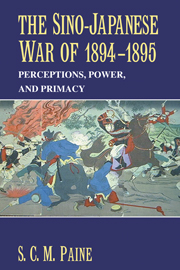Book contents
- Frontmatter
- Contents
- List of Maps
- Acknowledgments
- Part I The Clash of Two Orders: The Far East on the Eve of the War
- Part II The War: The Dividing Line Between Two Eras
- Part III The Settlement: The Modern Era in Far Eastern Diplomacy
- 7 The Treaty of Shimonoseki and the Triple Intervention
- 8 The Era of Global Politics
- 9 The Cultural Dimensions of the Sino-Japanese War
- Epilogue: Perceptions, Power, and War
- Bibliographic Essay
- Bibliography
- Index
9 - The Cultural Dimensions of the Sino-Japanese War
Published online by Cambridge University Press: 16 January 2010
- Frontmatter
- Contents
- List of Maps
- Acknowledgments
- Part I The Clash of Two Orders: The Far East on the Eve of the War
- Part II The War: The Dividing Line Between Two Eras
- Part III The Settlement: The Modern Era in Far Eastern Diplomacy
- 7 The Treaty of Shimonoseki and the Triple Intervention
- 8 The Era of Global Politics
- 9 The Cultural Dimensions of the Sino-Japanese War
- Epilogue: Perceptions, Power, and War
- Bibliographic Essay
- Bibliography
- Index
Summary
It is the law, as in the arts so in politics, that improvements ever prevail; and though fixed usages may be best for undisturbed communities, constant necessities of action must be accompanied by the constant improvement of methods.
Thucydides (471–400 B.C.)Do not look at what is contrary to ritual, do not speak what is contrary to ritual, and make no movement which is contrary to ritual.
Confucius (551–479 B.C.)From a Western point of view, the question immediately arises: Why did the Chinese choose such self-destructive policies during the Sino-Japanese War? By population, geographic extent, resources, traditional primacy, and shorter logistical lines, the Chinese should have won hands down. Yet they were pasted by a small island nation possessing none of these advantages. To answer this question, it is necessary to try to see the world as the Chinese and the nationals of the powers did in the late nineteenth century.
Today, in an era of innumerable dictionaries, how-to books, and crash courses, it is hard to imagine the information void in which Westerners, Chinese, and Japanese interacted in the late nineteenth century. The Industrial Revolution was at its height in the West, but the modern era of global politics was only dawning, and the communications revolution was a long way off. Each country had its own experts on the others, but these people were few and far between. While many educated Japanese were familiar with China, the reverse was absolutely not the case. In China travel abroad was stigmatized, so that a foreign assignment, considered indispensable training in Japan, was recognized to be career-threatening in China. Most Europeans and Chinese knew little about each other or Japan.
Information
- Type
- Chapter
- Information
- The Sino-Japanese War of 1894–1895Perceptions, Power, and Primacy, pp. 333 - 366Publisher: Cambridge University PressPrint publication year: 2002
